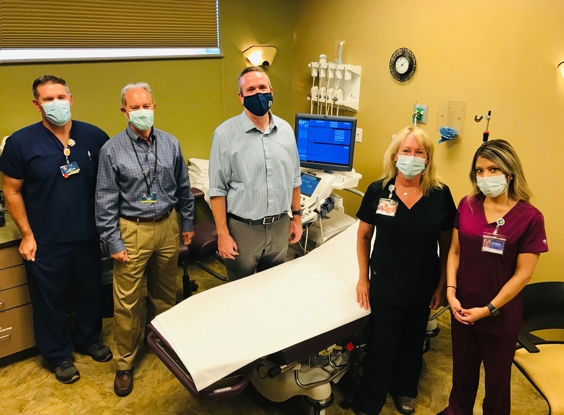Welcome to the Family Birth Center
At Gunnison Valley Health, we are dedicated to providing compassionate, personalized care during one of life’s most special moments—the birth of your child. As a Baby-Friendly designated facility, our Family Birth Center is committed to creating a supportive environment for you and your baby, focusing on safety, bonding and your overall well-being.
Why Choose the Family Birth Center?
- Baby-Friendly Designation: Our Baby-Friendly designation reflects our commitment to promoting breastfeeding and fostering a strong bond between mother and baby right from the start.
- Maternal and Infant Care Quality Champion: Gunnison Valley Health is recognized as a Maternal and Infant Care Quality Champion by the Colorado Perinatal Care Quality Collaborative (CPCQC). This designation means we have access to the most current data, best practices and resources available, leading the way for the safest, healthiest outcomes for Colorado’s pregnant and postpartum people, infants and their families.
- Participation in SOAR Program: We are proud participants in the Supporting Vaginal Delivery for Low-Risk Mothers (SOAR) program. SOAR aims to reduce unnecessary first-time cesarean sections through clinical education and data-driven changes, ensuring safer and healthier outcomes for mothers and babies.
- Experienced Care Team: Our highly skilled physicians and nurses are dedicated to ensuring you receive expert care tailored to your unique needs.
- Comprehensive Services: From prenatal care to postpartum support, we provide a full spectrum of services to guide you through your pregnancy journey.
- State-of-the-Art Facilities: Our Family Birth Center features comfortable, private birthing suites to ensure a safe and welcoming environment.
What to Expect at Our Family Birth Center
- Prenatal Care: Our team partners with you to develop a personalized birth plan and provides education on what to expect during labor and delivery.
- Labor and Delivery: We offer natural and medicated birth options, with a focus on your preferences and comfort. Our providers are experienced in handling both routine and high-risk deliveries.
- Skin-to-Skin Bonding: Immediately after birth, we encourage skin-to-skin contact to support breastfeeding and enhance bonding between you and your baby.
- Lactation Support: Our certified lactation consultants are here to help you navigate breastfeeding, providing expert guidance and encouragement.
- Postpartum Care: Your care doesn’t end after delivery. We provide resources and support to help you recover and thrive in the weeks following your baby’s birth.
Specialized Programs and Support
- Childbirth Education Classes: Prepare for labor and delivery with our educational programs that cover everything from pain management options to newborn care.
- Breast Milk Bank: We partner with Mothers’ Milk Bank to ensure that mothers who give birth in our Family Birth Center have access to breast milk for their infants as needed.
- Doula Services: We offer doula services to help make the childbirth experience easier for mom and dad. Contact your insurance company to determine if this service is available to you.
- Family-Centered Approach: We welcome your loved ones to be part of this special journey, offering flexible visiting hours and a family-friendly atmosphere.
Your Journey Starts Here
At Gunnison Valley Health, we understand that every pregnancy and delivery is unique. Our team is here to support you every step of the way, providing the highest level of care and compassion.
For more information, call the Gunnison Valley Health Family Birth Center at 970-641-7221.
-

-
Birth Experience Family Birth Center
My birth experience was incredible.
-Submitted by Anonymous -
Allowing Mom and Baby to Bond Family Birth Center
I appreciate you allowing the mom and baby bond just after birth. It is so important because we don't get that time back.
-Submitted by Anonymous




